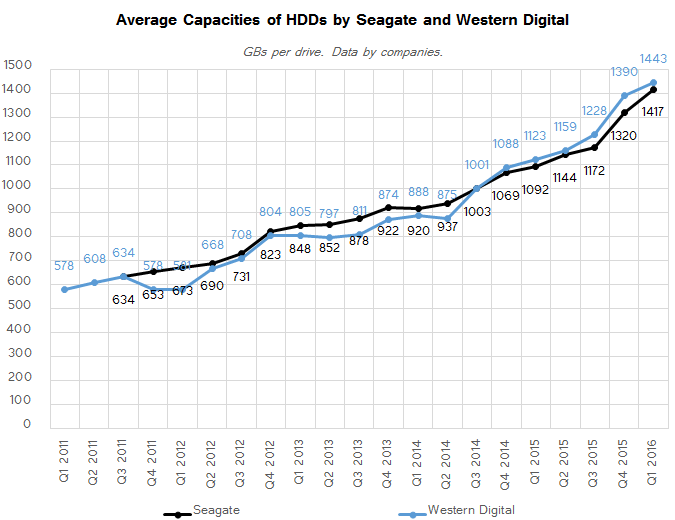Market Views: HDD Shipments Down 20% in Q1 2016, Hit Multi-Year Low
by Anton Shilov on May 12, 2016 8:00 AM ESTAverage HDD Capacities Continue to Increase
Despite the drop in HDD unit shipments, both sequentially and year-over-year, total capacities shipped by the two leading makers of hard drives increased in Q1. Seagate supplied 55.6 EB (Exabyte) of HDD storage last quarter, up from 54.6 EB in Q1 2015, but down from 60.6 EB in the previous quarter. The total capacity of Western Digital’s HDDs shipped in the first quarter of 2016 was approximately 62.2 EB, a moderate increase from 61.3 EB in Q1 2015.
When it comes to hard drives, one thing that has been growing quarter-over-quarter for a long time now is average HDD capacity, particularly in the enterprise segment, but not only there. In Q1 2016, an average drive could store around 1.4 TB of data, an increase of 28.5% (Western Digital) and 29.7% (Seagate) from the same quarter last year.
Average HDD Price Stays at $60 compared to Q1 2015
Despite the local price hikes by HDD makers, the industry can clearly produce more hard drives than it can consume, which is why prices of mass HDD models remain rather low. This will likely change in the future, when consumers shift to higher-capacity drives because of 4K UHD video or other reasons, but right now an average HDD from either Seagate of Western Digital costs approximately $60.
This will likely change after Seagate implements its plans to cut down its manufacturing capacities and supply-demand balance of the market will stabilize. However, it remains to be seen how significantly that is going to change going forward.













116 Comments
View All Comments
Shadow7037932 - Friday, May 13, 2016 - link
Pretty much this. MI recently built a new PC for my parents, and just put 240GB 850 EVO. Their 320GB HDD was only filled like 100GB after like 4+ years of use.Wolfpup - Thursday, July 14, 2016 - link
I just bought 2 8TB drives from Seagate, and I'm just hoping to last through the year with 'em. The needs for huge amounts of storage just keep ballooning, and ballooning way way faster than storage sizes have increased :-/maximumGPU - Thursday, May 12, 2016 - link
I've been HDD free for a year now, and i love it!bill.rookard - Thursday, May 12, 2016 - link
Agreed. I've been on SSDs for quite some time and have yet to have a single failure. Even my servers (which have been all SSD for about 3-4 years now) and get quite a bit of usage have yet to have a single issue. All my new builds have SSDs - I won't ever go back.Sivar - Thursday, May 12, 2016 - link
Re-posting because I replied to the wrong message earlier."That's well and good unless capacity and cost is important. Hard drives are still less than 1/5 the cost per gigabyte, and that's compared to TLC, which has a relatively limited write capability."
Wolfpup - Thursday, July 14, 2016 - link
Uh...I assume you mean mechanical drive free? (!)ex_User - Thursday, May 12, 2016 - link
More and more people don't store games & multimedia files locally. Fast internet connection plus Steam, Netflix, Spotify and such let you download your files anytime you want. Add to this cloud storage for photos and other personal files and no wonder most average users feel like there is no need for big, noisy HDDs, not to mention DAS & NAS. Yeah, consumer HDD is dying in front of us.TheinsanegamerN - Thursday, May 12, 2016 - link
The spread of data caps may put an end to that.fanofanand - Thursday, May 12, 2016 - link
Comcrap just raised their data caps in their "test markets" from 300 to 1 Tb so even that argument is going by the wayside. Of course when people are streaming 4k content that might change, but until 4k is prevalent, I don't think data caps will be a big issue for 99.9% of people.TheinsanegamerN - Thursday, May 12, 2016 - link
1TB is nothing. I alone can use a TB download games in a month, if I had a wife/kids, that cap would be far too low.Especially as more and more games push past 50GB.